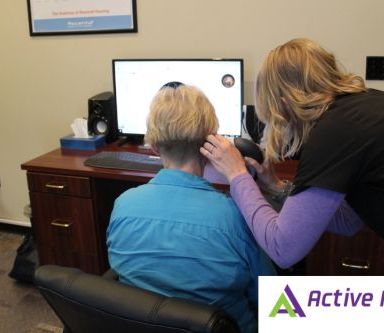
Hearing loss is related to several different health conditions. Heart disease, Covid-19 and memory can all be correlated with hearing loss. Another connection exists between hearing loss and diabetes. Both are widespread health concerns, and if you have diabetes, there are steps that can be taken to prevent hearing loss from developing as well.
Reports show that 37.3 million Americans, or about one out of every 10 people in the U.S., have diabetes, while approximately 48 million Americans experience some degree of hearing loss. Hearing loss can happen to anyone at any age, and loud noise can also put you at risk. Hearing loss is twice as common in adults with diabetes, compared to those who do not have the disease. As your local ear specialist, we wanted to give you some helpful information on how you can reduce the risk of hearing loss if you have diabetes.
The connection between diabetes and hearing loss
Diabetes is a condition that occurs when your blood sugar, or glucose, levels are too high. More research needs to be done to figure out why exactly people with diabetes have a higher rate of hearing loss. What we do know is that high blood sugar levels can damage blood vessels and nerves throughout your body, ears included. This type of nerve damage in the inner ear can lead to hearing loss.
Low blood sugar levels can also impact the nerve signals that travel from the inner ear to the brain. Prediabetes can also play a role in hearing loss. Prediabetes is when your blood sugar levels are higher than they should be, but not high enough to be diagnosed with type 2 diabetes. This can make you more susceptible to developing hearing loss than those with a healthy blood sugar level.
Signs of hearing loss
There are numerous signs of hearing loss, and one person may experience some or all of the symptoms. It’s common for your friends and family to notice that you are experiencing hearing loss before it becomes apparent to you. Signs of hearing loss include:
-
Having to ask others to repeat themselves
-
A hard time following conversations with one or more people
-
Thinking that others are mumbling when they’re fully speaking
-
Difficulty hearing in loud environments
-
Problem hearing quiet voices, like those of women and children
-
Having to keep turning up the TV or radio volume
What you can do to help protect your ears if you have diabetes
If you have diabetes, there are certain ways you can prevent hearing loss or keep your hearing from getting worse. Keeping your blood sugar levels as regulated as possible can help. It’s important to get your hearing checked yearly to determine if you have hearing loss or to find out the extent of your hearing loss.
Avoiding other causes of hearing loss, such as loud environments and noises, can also help. It’s important to wear ear protection when in a loud environment such as a concert. You should also make sure that any medications you’re currently taking aren’t damaging your hearing, and ask your doctor if there’s any alternatives available.
When to see an ear specialist
When you first find out you have diabetes, there can be a lot on your plate. You should get your hearing checked as soon as you can and then every year after. You can talk to your doctor and they can let you know if you should see an ear specialist. We’re more than happy to help you continue living your best life. Contact us today to schedule a hearing consultation!






Comments